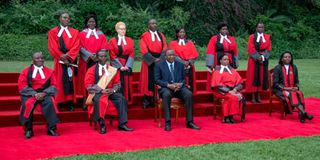Find a way to defuse bad blood between Executive, Judiciary

President Uhuru Kenyatta and Chief Justice Martha Koome (second right) with Judges of the Court of Appeal at State House, Nairobi during the swearing-in ceremony of recently gazetted Judges. On the right is Chief registrar of the Judiciary, Anne Amadi.
That is, indeed, a fact if you were to measure it against the Constitution. Anybody could be a president if they are able and willing to rule by the laws of the land and not of men. I say “men” since they are the only ones hankering for the position to succeed President Uhuru Kenyatta in 2022.
Kenyan men have been allowed by our patriarchal society to be the natural heirs to the throne and, sadly, the status quo is not due to change, looking at the current line-up of presidential aspirants.
This article is inspired by continued friction between the Executive and the Judiciary, the latest case being the partial appointment of judges. President Kenyatta’s appointment of 34 judges out of the 40 names submitted to him by Judicial Service Commission (JSC) led to hue and cry. Amid speculations for the decision was that those left out were part of the group that ruled against the BBI project.
The Constitution does not allow the President to overrule the JSC on appointment of judges. Article 172 (1) (a) states: “The Judicial Service Commission shall promote and facilitate the independence and accountability of the Judiciary and the efficient, effective and transparent administration of justice.” It adds that “JSC shall recommend to the President persons for appointment as judges”.
Appoint the six judges
The President’s decision not to appoint the six judges has, no doubt, caused anxiety in the country. It is this anxiety that is troublesome. It is troublesome because the President’s unilateral decision to do as he deemed fit with the selection of judges has left many asking whether he was drawing his powers on appointment of judges on the current Constitution or the pre-2010 one, where the President had the sole power to hand-pick judges. The latter seems more likely and, if so, it is a slippery slope.
In the past few years, one thing that has been apparent in the current regime is total disregard for court orders. Many more have been issued recently. Several decisions have been made by the courts that went against the Executive.
It is easy to think that the Judiciary is out to get the state, which pro-government supporters would want to believe but, in fact, it is the rule of law at play. Our Judiciary is, for once, able to exercise its independence.
Struggling with the concept
The independence of the individual three arms of government is not what many politicians from the old regimes are used to. Those remnants in government are still struggling with the concept that state powers can, in fact, be checked and, if need be, balanced.
The ‘toing and froing’ between the various arms of government as they exercise their roles within the ambit of the law is, in fact, healthy for the country. We cannot talk of democracy but then turn around and stifle institutions that are crucial at holding up democratic pillars.
Despite the current Constitution having been mooted to fight impunity, the vice refuses to die and keeps fighting back through leaders who are struggling with adhering to the rule of law and democracy. The country seems, once again, as being ordered through the prism of the dark days, when democracy and the rule of law were considered anathema.
Looking backwards for inspiration is making it hard to rule a modern Kenya that has invested wholeheartedly in the spirit of the current Constitution, which gives Kenyans more individual autonomy and powers to question and challenge rogue authority. Any government, present and in future, that wishes to succeed would be best placed to rule by law than impunity.
The Judiciary has pronounced itself on doing its part and is working towards realising the benefits accruing to the citizens as embedded within the Constitution. That is why they have boldly ruled in favour of the public whenever the state has overreached its powers. Something the state finds reprehensible because it is not accustomed to having its unlawful activities put to question.
The Executive arm of government now ought to accept the status quo and save itself the headache of having to be dragged to court every time it is out of line. It is bound to happen a lot more as the country’s democracy becomes stronger.
Rule by impunity is creating anxiety and tension in the country. It is not progressive or healthy for the nation. Leaders, especially the politicians, need to consider the impact of abuse of power on the country as they doggedly pursue individual interests.
It is easier to be Kenya’s President if one sticks to the rules.
[email protected]. @kdiguyo





